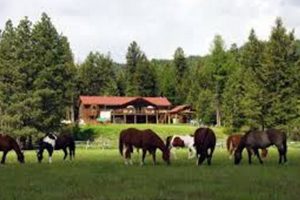
A Big Ranch In A Investigation Of E. Coli Clues. It’s a big ranch: Several thousand acres of cattle pasture, dotted with wells and holding ponds, surrounding a cluster of spinach fields. A creek flows about a mile downhill from the crops, and wild pigs treat the land like it’s their own back yard. More than […]

A Big Ranch In A Investigation Of E. Coli Clues. It’s a big ranch: Several thousand acres of cattle pasture, dotted with wells and holding ponds, surrounding a cluster of spinach fields. A creek flows about a mile downhill from the crops, and wild pigs treat the land like it’s their own back yard.
More than a dozen state and federal health inspectors spent Friday combing the property that has become, at least for the moment, ground zero in a nationwide investigation of lethally contaminated spinach.
With the news that genetic tests have linked the contamination to a deadly bacteria found in cattle manure on the property, attention has turned to possible connections between the animals that graze and the spinach that’s grown on adjoining portions of the ranch.
Investigators are trying to determine whether the bacteria was transferred by livestock, wild animals, humans, water or even dust that was blown by the wind. But state officials, who have refused to identify the property or its owners, stressed Friday that the problem goes beyond one farm.
With nine outbreaks of E. coli contamination traced to spinach and lettuce grown in the Salinas Valley in the past decade, Dr. Kevin Reilly, deputy director for the state Department of Health Services, said the outbreaks clearly have involved “a number of farms and ranches. There is some means by which the environment is being contaminated.”
Cattle ranchers, produce-growers and food-safety experts have all known for years that there are acknowledged “good practices” to prevent or at least minimize the chances of spreading E. coli from its natural environment the intestinal tracts of livestock and other animals to food that is grown for human consumption.
The list includes separating pasture from cropland with berms or other barriers, making sure that water does not flow from one property to the other, and keeping domestic and wild animals from wandering into fields where produce is being grown.
But experts and health officials say it’s obvious those practices are not always followed. Consumer advocates say that’s an argument for making the rules mandatory, with stiff penalties for violations. Others say it’s easier said than done.
“Ideally, you would like to maximize the separation, but the realities of agricultural environments in California quite often bring animals and plants in close proximity,” said Trevor Suslow, a plant scientist who studies food safety at the University of California-Davis.
Enforcement challenge
California has thousands of farms, big and small, Suslow noted. “It’s appropriate to start talking about standards and setbacks,” he added, “but they’re going to be tough to enforce.”
The problem usually starts with livestock. Experts say individual animals pick up the E. coli bacteria from sharing feed, water or bedding with other animals, about as easily as kindergartners share colds.
But the strain known as E. coli 0157:H7, although potentially deadly to humans, causes no obvious symptoms in cattle, said Michael Davidson, a professor of microbiology and food safety at the University of Tennessee.
Some studies have suggested that cattle are less likely to develop the 0157:H7 strain when they graze in pastures, as opposed to eating grain in feedlots. Davidson and Alejandro Castillo, a microbiologist who studies food safety at Texas A&M University, said other studies dispute that conclusion.
Because the bacteria is often found in the animals’ manure, associations representing ranchers and growers say they recognize the importance of keeping livestock away from cropland and from water that’s used to irrigate the crops. (Many growers also say they avoid using manure as fertilizer, or apply only products that have been processed to destroy dangerous bacteria.)
What’s too close?
But Castillo said there’s not always agreement on how much separation is needed. “Having a field next to a feedlot is bad, but some might say a half-mile away is too close.”
The Salinas area produces more than half the nation’s fresh spinach and 80 percent of its lettuce. Growers in the region say they aren’t waiting for new federal guidelines to begin routinely testing their water and soil.
King City spinach grower Andrew Cumming said his company, Metz Fresh, conducts tests of plant tissue before crops are harvested, and after they are packaged.
“Most growers are scared to death” by the recent outbreaks, he said.
A spokeswoman at Natural Selection Foods, the San Juan Bautista processor that health officials identified as handling much of the contaminated spinach in the latest outbreak, said her company has also instituted new testing procedures aimed at keeping dangerous bacteria out of its facilities.
But Seattle attorney Bill Marler, who is filing lawsuits on behalf of several people who got sick last month, said processors and distributors are still liable for any contaminated food they sold. Federal authorities are also examining company records for evidence of negligence or criminal violations.
Reilly, the state health official, said the current focus on one ranch doesn’t let other growers off the hook. Inspectors are testing samples at three other ranches, although none has had positive results. And he said the whole industry needs to focus on preventing contamination.
Suslow agreed. “I think we can learn a lot from this latest episode, but that doesn’t really change the basic principals of good agricultural practices that have been around for at least 10 years.”
The personal injury attorneys at Parker Waichman LLP offer free, no-obligation case evaluations. For more information, fill out our online contact form or call 1-800-YOURLAWYER (1-800-968-7529).


